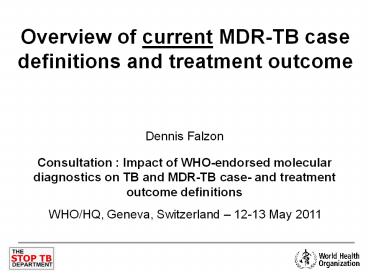Overview of current MDR-TB case definitions and treatment outcome - PowerPoint PPT Presentation
Title:
Overview of current MDR-TB case definitions and treatment outcome
Description:
Overview of current MDR-TB case definitions and treatment outcome Dennis Falzon Consultation : Impact of WHO-endorsed molecular diagnostics on TB and MDR-TB case- and ... – PowerPoint PPT presentation
Number of Views:97
Avg rating:3.0/5.0
Title: Overview of current MDR-TB case definitions and treatment outcome
1
Overview of current MDR-TB case definitions and
treatment outcome
- Dennis Falzon
- Consultation Impact of WHO-endorsed molecular
diagnostics on TB and MDR-TB case- and treatment
outcome definitions
WHO/HQ, Geneva, Switzerland 12-13 May 2011
2
Reference
whqlibdoc.who.int/publications/2008/9789241547581_
eng.pdf
3
Definitions (1)
- Allow different workers throughout the programme
to think in the same way - Standardize the assignment of treatment to
patients - Define a cohort for outcome monitoring
- Make meaningful comparisons
- Between projects and countries
- Over time
4
Definitions (2)
- Bacteriology
- Case registration
- Treatment outcomes
5
Bacteriology (1)
- DR-TB is a laboratory definition
- Laboratory needed for
- diagnosis
- follow-up
- outcome determination
6
Bacteriology (2)
- Mono-resistance resistance to one anti-TB
drug. - Poly-resistance resistance to more than one
anti-TB drug, other than both isoniazid and
rifampicin. - Multidrug-resistance resistance to at least
isoniazid and rifampicin. - Extensive drug-resistance resistance to any
fluoroquinolone, and at least one of three
injectable second-line drugs (capreomycin,
kanamycin and amikacin), in addition to
multidrug-resistance.
For cases tested to all the "usual" anti-TB
drugs (RHEZSSLDs)
7
Bacteriology (3)
- Sputum conversion
- 2 samples at least 30 days apart with negative
results - The date of the first set of negative tests used
as the date of conversion for interim outcome,
and length of the initial phase and treatment
8
Case registration (1)
- Category IV includes
- - Confirmed MDR-TB
- - Suspected MDR-TB country criteria
- - Poly-resistant TB certain types
9
Case registration (2)
- 1. By previous drug use
- - New
- - Previously treated, first-line drugs only
- - Previously treated, second-line drugs
Treated for TB, for at least one month or
4-weeks
10
Case registration (3)
- 2. By patient registration group
- - New
- - Relapse
- - After default
- - After failure of Category I
- - After failure of Category II
- - Transfer in
- - Other
11
Case registration (4)
- Other
- - smear positive, previous history unknown
- - smear positive, previous history not Cat I /
II - - previously treated extrapulmonary
- - "chronics"
12
Treatment outcomes (1)
1) interim outcomes 6-months 2) definitive
outcomes 24-, 36-months - mutually
exclusive - "first outcome met" principle -
cured failed defined by culture
13
Treatment outcomes (2)
1) Cured 2) Treatment completed 3) Died 4)
Failed 5) Defaulted 6) Transferred out
14
Treatment outcomes (3)
Cured A Category IV patient who has completed
treatment according to programme protocol and has
at least five consecutive negative cultures from
samples collected at least 30 days apart in the
final 12 months of treatment. If only one
positive culture is reported during that time,
and there is no concomitant clinical evidence of
deterioration, a patient may still be considered
cured, provided that this positive culture is
followed by a minimum of three consecutive
negative cultures taken at least 30 days apart.
15
Treatment outcomes (4)
Failed Treatment will be considered to have
failed if two or more of the five cultures
recorded in the final 12 months of therapy are
positive, or if any one of the final three
cultures is positive. (Treatment will also be
considered to have failed if a clinical decision
has been made to terminate treatment early
because of poor clinical or radiological response
or adverse events. These latter failures can be
indicated separately in order to do subanalysis)
16
Definition of Failed
- Can only be applied retrospectively
- Does not indicate point in time when failure
occurs - Change of a failing regimen not accounted for
- Focused primarily on bacteriology
17
Treatment outcomes (5)
CURED last 12 months, 5 negative cultures
?
?
?
18
Minimum MDR Indicators, 2010
whqlibdoc.who.int/hq/2010/WHO_HTM_TB_2010.11_eng.p
df
19
Revised RR for MDR (1)
Disaggregation Indicator Group
Risk categories Detection (4)
Children, females, HIV-positive on ARV Enrolment (4)
None Interim results (5)
HIV positive XDR (success and death) Final outcomes (6)
Recommended stratification as per conditions
specified in instructions
20
Changes (1)
- Separate stratifications for
- Risk categories (detection)
- Children (enrolment)
- Females (enrolment)
- HIV-positive individuals (/- ART) (enrolment,
outcome) - Coverage of DSTing and DST results in risk
groups - No stratification of outcome by prior treatment
history - Separate outcomes for XDR and HIV positive where
indicated - Intervals (delays) in diagnosis and in start of
treatment
21
Changes (2)
- Detection enrolment minimum frequency
- Ratio of "enrolled to identified" MDR
- Interim outcome just 6-month conversion of
culture - Outcomes transferred out merged with
unevaluated information on unwarranted MDR/XDR
treatment - No changes in the definitions, registers or
treatment card
22
Acknowledgements for the Minimal MDR indicators
- Working group Dennis Falzon, Philippe Glaziou,
Nico Kalisvaart, Joël Keravec, Carole Mitnick,
Pierre-Yves Norval, Edine Tiemersma, Arnaud
Trébucq, Francis Varaine - Substantive comments Amal Bassili, Jaime
Bayona, Salem G Barghout, Léopold Blanc,
Haileyesus Getahun, Agnes Gebhard, Christian
Gunneberg, Peter Metzger, Nani Nair, Norbert
Ndjeka, Wilfred Nkhoma, Mamel Quelapio, Vija
Riekstina, Sarah Royce, Patricia Shirey, Fraser
Wares, Matteo Zignol































